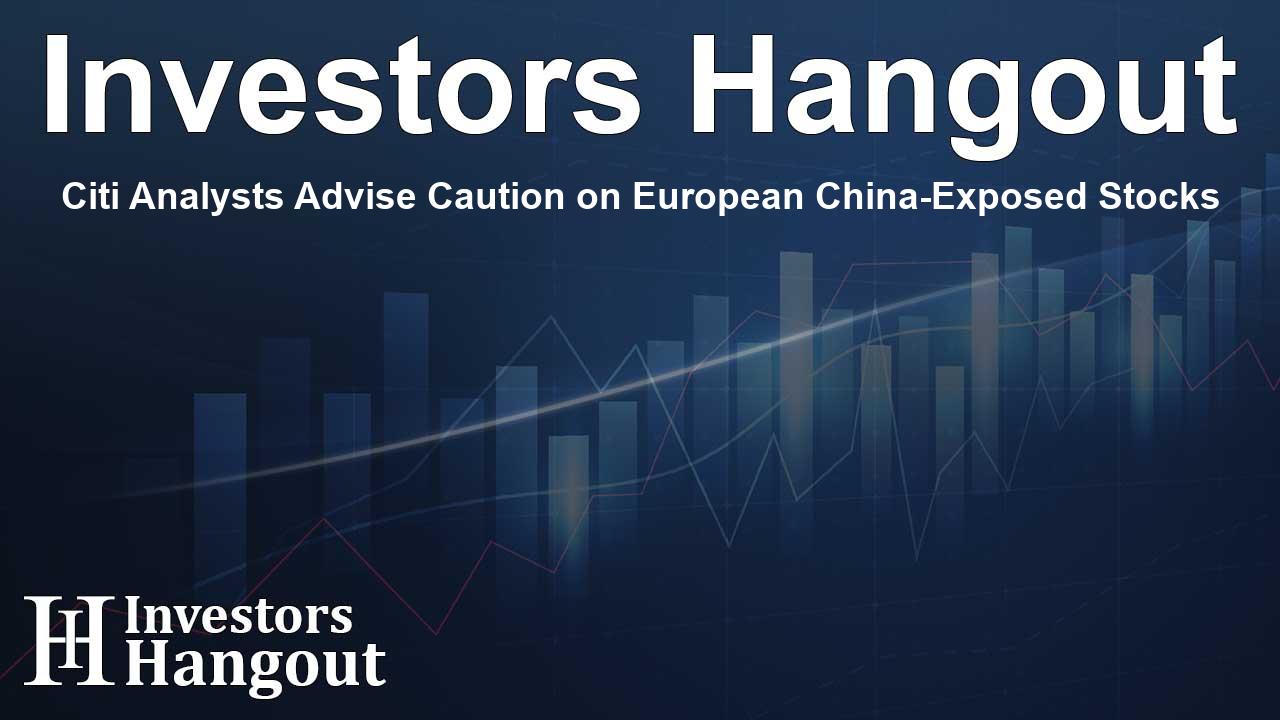Citi Analysts Advise Caution on European China-Exposed Stocks

Citi Analysts Urge Caution on European Stocks Sensitive to China
As we navigate the complexities of the global market, Citi analysts have expressed prudent caution regarding European stocks that are significantly linked to China, often referred to as 'China proxies.' This nomenclature encapsulates companies that derive substantial revenue from their operations or sales tied to the Chinese markets.
The Present Landscape of China’s Economic Recovery
The economic landscape surrounding China is currently tumultuous, with various analysts pointing out that 2024 has not unfolded as many had hoped for. Beijing's ambitious target of achieving 5% GDP growth now stands on shaky ground amidst underwhelming economic indicators.
Citi's recent assessments highlight a concerning decline in manufacturing output, which is reflected in consistently low Purchasing Managers' Index (PMI) figures — a key indicator of economic health. The presence of deflationary pressures further underscores the ongoing macroeconomic challenges.
Manufacturing Output and Economic Indicators
Even with some government measures aimed at providing stability, such as issuing bonds and adjusting interest rates, Citi emphasizes that these efforts have not yielded any significant boosts to investor confidence. Analysts at Citi note that their selection of China-sensitive stocks across Europe has dipped approximately 7% year-to-date, trailing behind broader indices like the STOXX 600.
Earnings Outlook for China-Linked European Companies
A critical component of the analysis involves the performance of European companies that rely heavily on the Chinese market. The earnings estimates for these firms have suffered, showing revisions downwards by about 10% this year. Comparatively, the STXX 600 index only experienced a minor 3% decline. The luxury goods sector, technology firms, and healthcare industries have been particularly affected.
Challenges Faced by Key Industries
These industries have encountered significant hurdles, with the luxury sector reporting that almost a third of their global sales originate from Chinese consumers. The anticipated rebound in demand has yet to materialize, prompting ongoing earnings downgrades, particularly for manufacturers reliant on Chinese demand.
The technology sector, notably European chipmakers, is facing uncertainty as visibility into future Chinese demand remains bleak. Industrial companies have also moderated their expectations, as many do not foresee a recovery in manufacturing until at least 2025.
The Outlook: Risks vs. Rewards
Given this landscape, Citi analysts maintain a stance of caution when it comes to investing in these China proxies. They affirm that the ongoing challenges within China’s economy, combined with an absence of robust policy measures, lead to a probable continued decline in earnings.
Geopolitical issues add another layer of complexity, especially with the impending U.S. elections. These factors pose potential risks to the Chinese market, further complicating the conditions for European companies sensitive to its performance.
Long-Term Opportunities Await
However, amid the current challenges, there may be glimmers of hope for the long term. Should China's economic situation stabilize or if the government enacts more decisive action to stimulate growth, these stocks might regain attractiveness. Opportunities may arise from lower valuations and reduced exposure to ongoing geopolitical tensions, potentially paving the way for future gains.
Conclusion: Waiting for Clarity
Citi's recommendations mirror the broader market sentiment, suggesting it remains premature to place bets on a recovery for Europe's China proxies. As the global economic environment evolves, investors must exercise patience and wait for clearer signs of economic stability in China and more substantial policy interventions before embarking on investment decisions regarding these stocks.
Frequently Asked Questions
What are China proxies?
China proxies refer to European stocks that derive significant revenue from operations or sales linked to the Chinese market.
Why are Citi analysts cautious about these stocks?
The analysts cite ongoing economic uncertainties in China, weak manufacturing output, and low demand as key concerns for potential investors.
Which sectors are most affected by China's economic issues?
Luxury goods, technology firms, and healthcare industries have faced significant challenges due to their heavy reliance on the Chinese market.
What could make these stocks attractive in the future?
Improvements in China's economic outlook or stronger government actions to stimulate growth could rekindle investor interest in these stocks.
What should investors do now regarding these stocks?
Investors are advised to remain cautious and seek clearer indicators of recovery in China before considering investments in these stocks.
About Investors Hangout
Investors Hangout is a leading online stock forum for financial discussion and learning, offering a wide range of free tools and resources. It draws in traders of all levels, who exchange market knowledge, investigate trading tactics, and keep an eye on industry developments in real time. Featuring financial articles, stock message boards, quotes, charts, company profiles, and live news updates. Through cooperative learning and a wealth of informational resources, it helps users from novices creating their first portfolios to experts honing their techniques. Join Investors Hangout today: https://investorshangout.com/
Disclaimer: The content of this article is solely for general informational purposes only; it does not represent legal, financial, or investment advice. Investors Hangout does not offer financial advice; the author is not a licensed financial advisor. Consult a qualified advisor before making any financial or investment decisions based on this article. The author's interpretation of publicly available data shapes the opinions presented here; as a result, they should not be taken as advice to purchase, sell, or hold any securities mentioned or any other investments. The author does not guarantee the accuracy, completeness, or timeliness of any material, providing it "as is." Information and market conditions may change; past performance is not indicative of future outcomes. If any of the material offered here is inaccurate, please contact us for corrections.